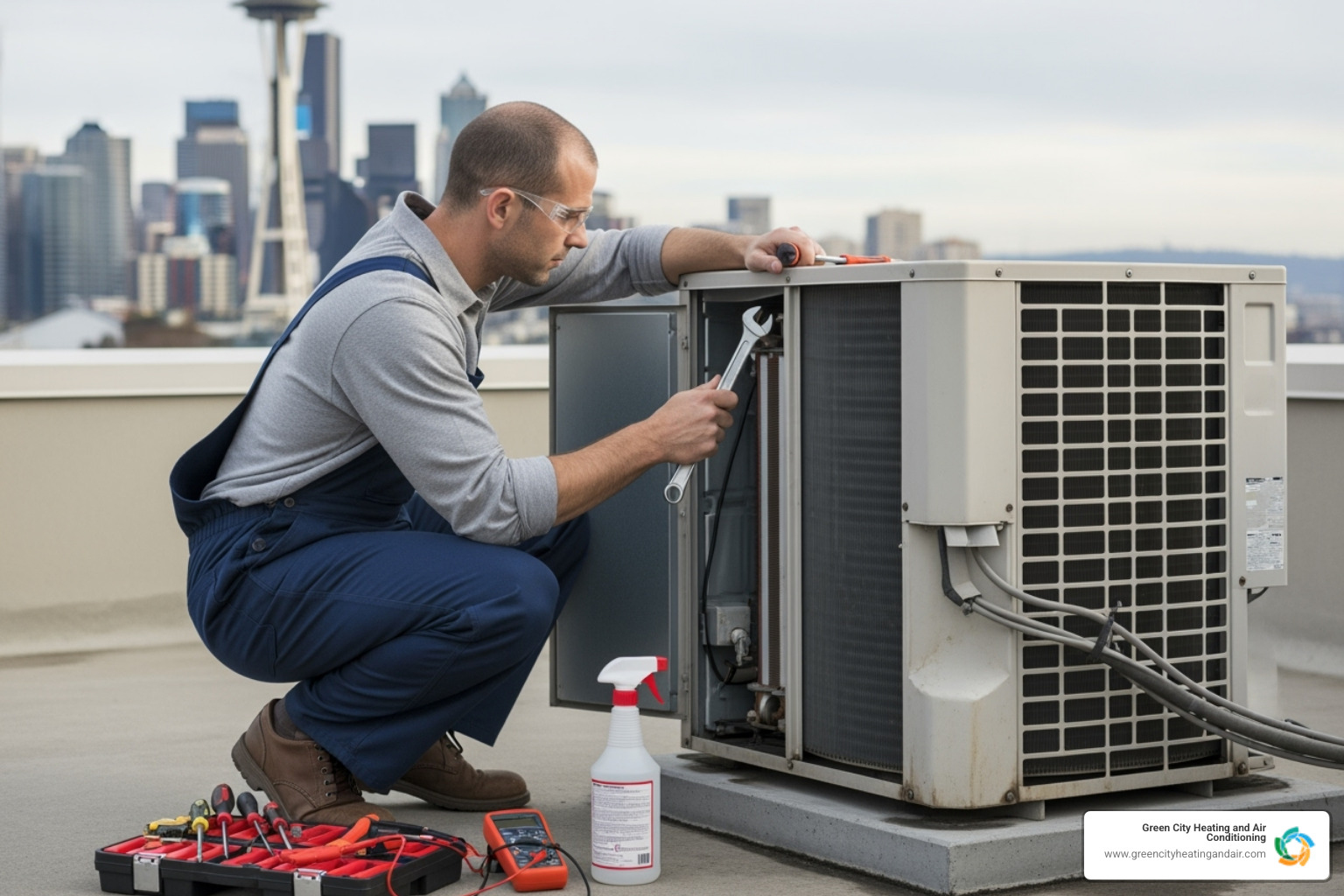Why a Career in HVAC is a Smart Move
A licensed HVAC technician is a skilled professional who has completed formal training, gained hands-on experience, and obtained the legal credentials to install, maintain, and repair heating, ventilation, and air conditioning systems. Here's what defines a licensed HVAC professional:
Key Requirements for Licensed HVAC Technicians:
- High school diploma or GED - foundational education requirement
- Formal training - pre-apprenticeship programs or vocational school (12 weeks to 2 years)
- Apprenticeship experience - 2-5 years of hands-on training (up to 8,000 hours)
- Professional certifications - EPA 608, NATE, or trade-specific credentials
- State/provincial license - legal authorization to work independently
- Continuing education - ongoing training to maintain credentials
The HVAC industry is experiencing unprecedented growth and opportunity. The demand for skilled tradespeople will increase significantly as older generations retire in the next five to ten years, creating a shortage of approximately 110,000 workers by 2025.
This creates exceptional job security for new professionals entering the field. Licensed HVAC technicians earn competitive salaries, with experienced technicians making $90,000 per year or more in specialized roles like project management and controls technology.
Beyond financial rewards, HVAC work provides meaningful impact. These professionals maintain comfortable and healthy indoor environments while contributing to energy efficiency and sustainability through modern, eco-friendly systems.
The career path is clear and achievable. Most training programs can be completed in just 12 weeks to 2 years, leading to stable employment in an essential service industry that will always be needed.
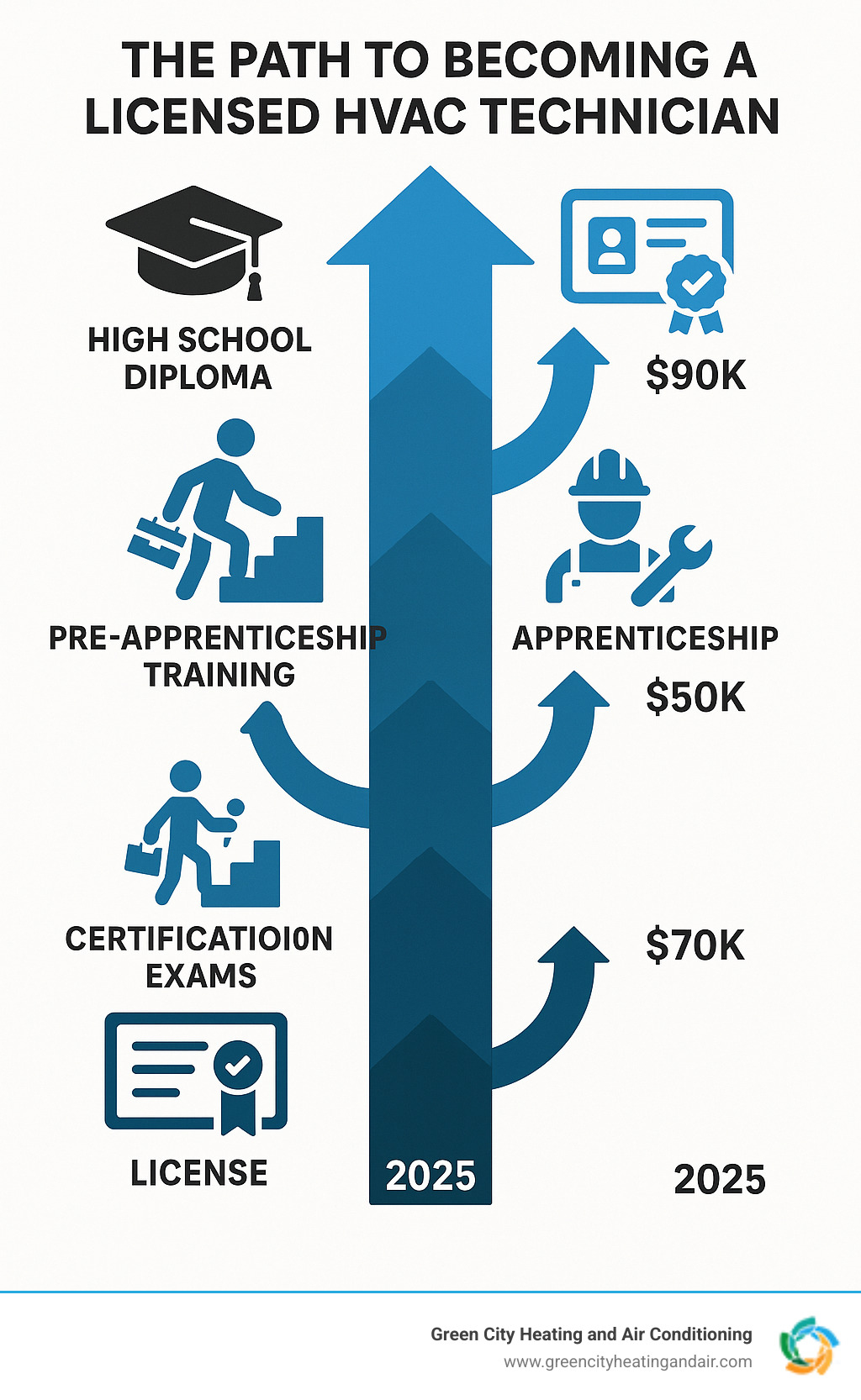
The Path to Becoming a Licensed HVAC Technician
Becoming a licensed HVAC technician is a journey with clear, sequential steps. Each stage builds on the last, guiding you from beginner to skilled professional.
Step 1: Build Your Educational Foundation
Your career starts with a high school diploma or GED. Coursework in mathematics, physics, and chemistry is particularly valuable, as these subjects provide the foundational knowledge for calculating system loads, understanding energy transfer, and working with refrigerants. This knowledge becomes practical when you're sizing ductwork or calculating BTU requirements.
Step 2: Enroll in Formal HVAC Training
Next, enroll in a formal training program where theory meets hands-on practice.
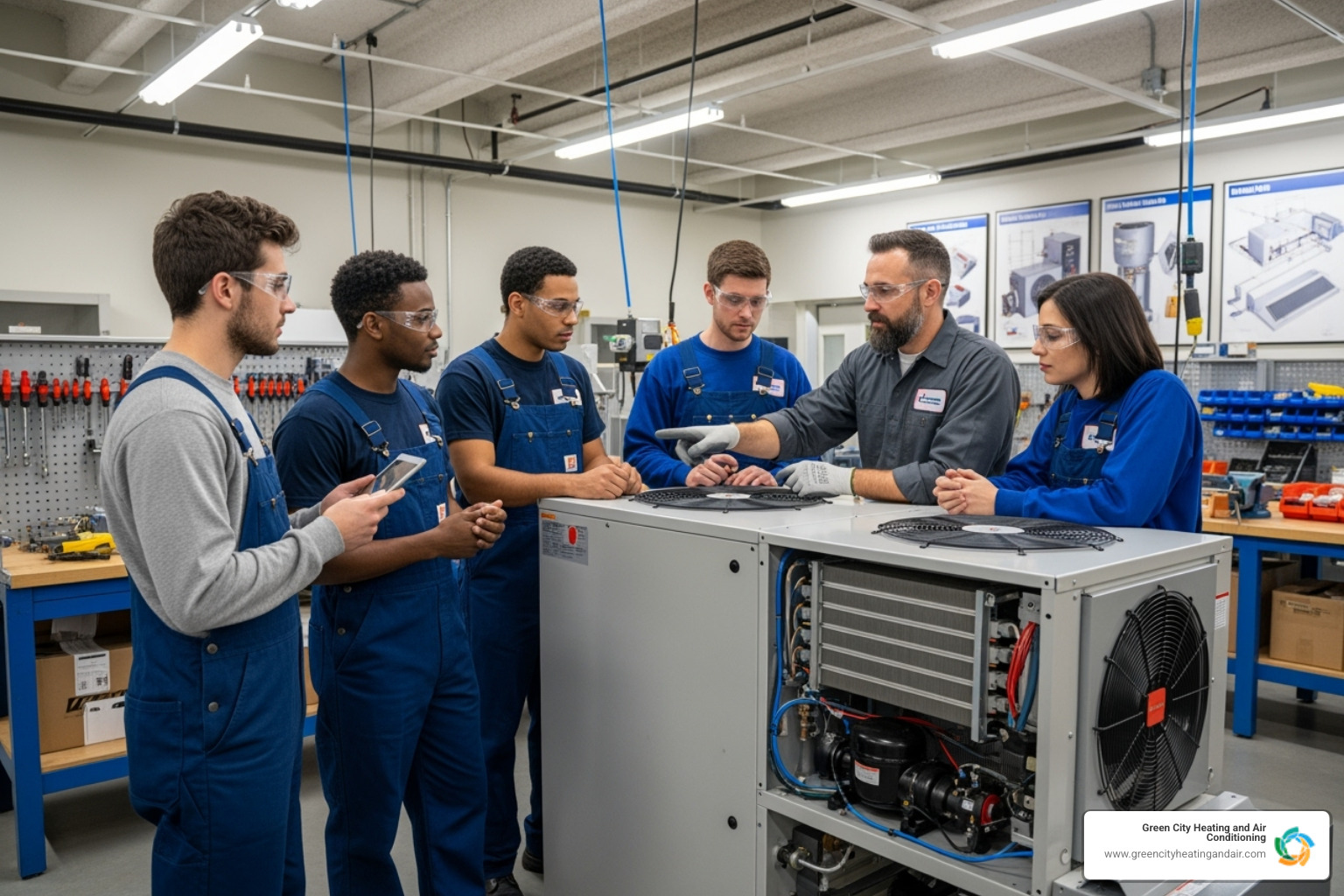
- Pre-apprenticeship programs offer a fast track, often taking just 12 weeks to cover the fundamentals of installation, maintenance, and repair.
- Vocational schools and community colleges provide more in-depth training over one to two years, combining classroom instruction with extensive lab work on real equipment.
Safety is paramount. Your training will include essential certifications like WHMIS (Workplace Hazardous Materials Information System) and Working at Heights, along with training in lockout procedures, scaffold safety, and confined space awareness.
Step 3: Gain Essential Work Experience
Classroom learning is vital, but it can't replace on-the-job experience. Apprenticeships are the industry standard for gaining practical skills, typically lasting one to five years. These programs pair you with experienced mentors for structured, paid training. For example, some mechanic apprenticeships require over 6,000 hours of hands-on work.
This mentorship is invaluable for learning real-world troubleshooting and customer service skills. You'll gain experience in diverse settings, from residential homes to large commercial and industrial sites. Most states have specific experience hour requirements for licensure. For instance, California requires four years of experience, while Idaho mandates 8,000 hours for an Unrestricted HVAC License. These requirements ensure that every licensed HVAC technician has proven expertise.
Decoding HVAC Licenses and Certifications
Understanding the credentials that validate your skills and grant you the legal authority to work is crucial for a successful career.
HVAC Licensing vs. Certification: What's the Difference?
While often used interchangeably, licenses and certifications serve different purposes. In short: certification proves your knowledge, while licensing gives you legal permission to work.
| Feature | HVAC License | HVAC Certification |
|---|---|---|
| Purpose | Legal authorization to work | Proof of knowledge and competency |
| Issued By | Government agencies (state, provincial, local) | Industry bodies (e.g., EPA, NATE, RSES) |
| Scope | Location-specific (state, province, city) | Nationally or industry recognized |
| Requirement | Often legally mandated for professional work | May be required for licensing or preferred by employers |
| Focus | Legal compliance, public safety | Skill validation, industry standards |
A certification is issued by an industry organization after you pass an exam, showing employers you've mastered specific skills. A license is issued by a government agency, permitting you to work legally and ensuring you meet public safety standards. For a licensed HVAC technician, both are vital for legal compliance, professional credibility, and meeting insurance requirements.
Key Certifications You'll Need to Succeed
Certain certifications are your ticket to better jobs and higher pay.
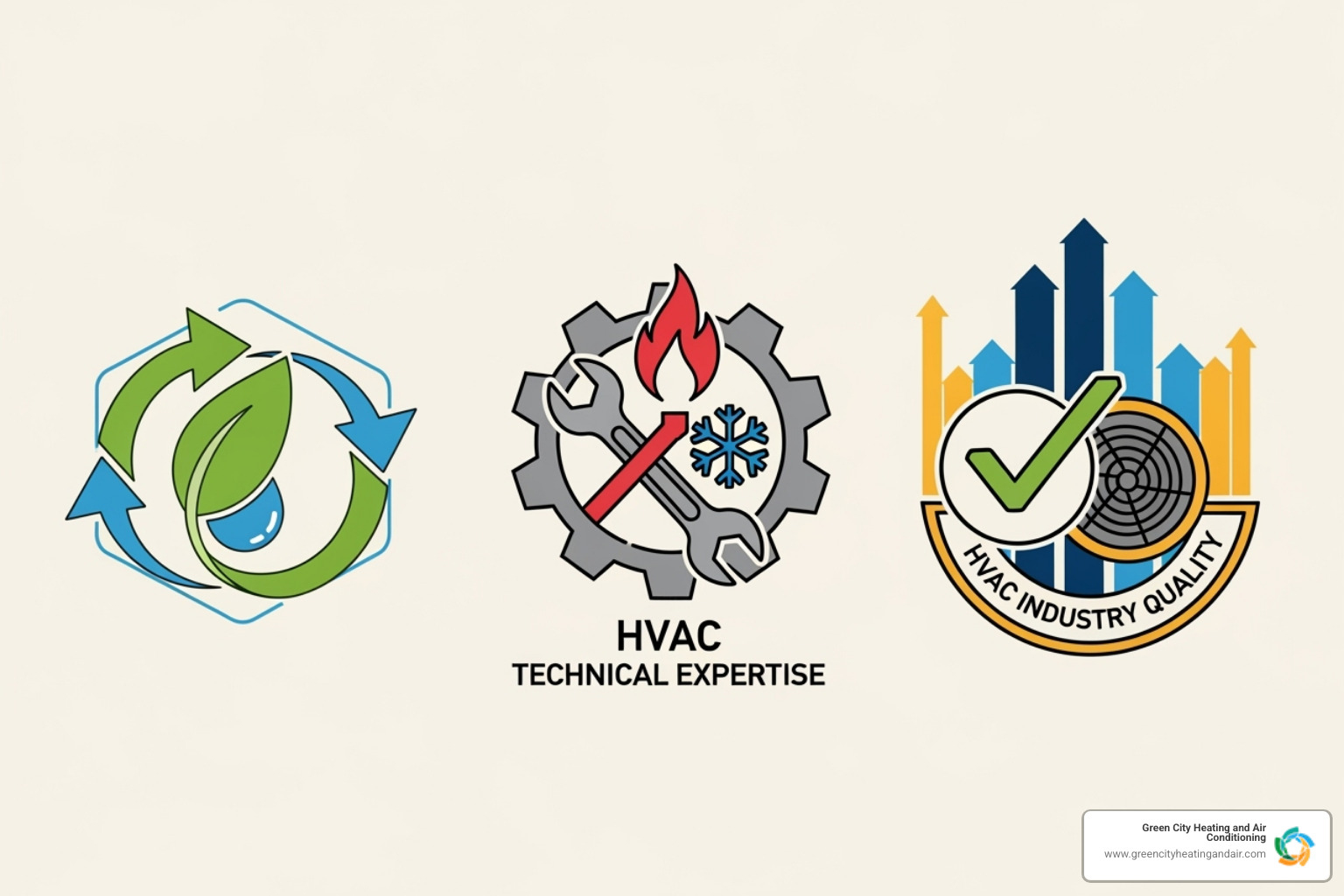
- EPA 608 Certification: This is mandatory for anyone who handles refrigerants. The Environmental Protection Agency requires it to ensure these chemicals are handled safely. Most technicians obtain the Universal certification, which covers all appliance types and is valid for life. You can learn more about EPA 608 certification directly from the EPA.
- NATE Certification: North American Technician Excellence (NATE) is the industry's gold standard. While not always required, it proves your expertise in specialty areas like air conditioning or gas furnaces and makes you a more attractive candidate to employers.
- HVAC Excellence: These "stackable" certifications allow you to build credentials in specific areas like installation, system design, and maintenance, demonstrating a commitment to mastering the trade.
- RSES Certification: The Refrigeration Service Engineers Society offers credentials focused on the technical fundamentals and advanced troubleshooting needed for complex refrigeration systems.
Understanding Canadian HVAC Licensing
For those working in Canada, the system uses specific trade certifications rather than a single HVAC license. Key credentials include the 313A for commercial/industrial systems, 313D for residential air conditioning, and Gas Technician (G1, G2, G3) licenses for gas and propane systems. The Red Seal Program allows certified tradespeople to work across any province or territory without re-certifying, offering valuable career mobility. You can learn about the Red Seal designation for complete details on this interprovincial credential.
Career Paths, Specializations, and Earning Potential
A license opens the door to a wide range of opportunities and significant earning potential within the growing HVAC industry.
Why Being a Licensed HVAC Technician is Non-Negotiable
Becoming a licensed HVAC technician is essential for a successful career. A license is your professional passport, providing key benefits:
- Increased Earning Potential: Licensed technicians consistently command higher wages than their unlicensed counterparts.
- Expanded Job Eligibility: The best companies require licensed professionals to ensure safety, compliance, and quality service.
- Contracting and Business Opportunities: In most jurisdictions, a license is required to work independently or start your own HVAC business.
- Proof of Competence: A license publicly declares that you have met rigorous training and examination standards.
- Customer Trust: Homeowners have peace of mind knowing their essential comfort and safety systems are in the hands of a qualified, legally authorized professional.
Diverse Career Paths and Specializations
Your skills as a licensed HVAC technician open up a world of fascinating specializations beyond standard installation and repair.
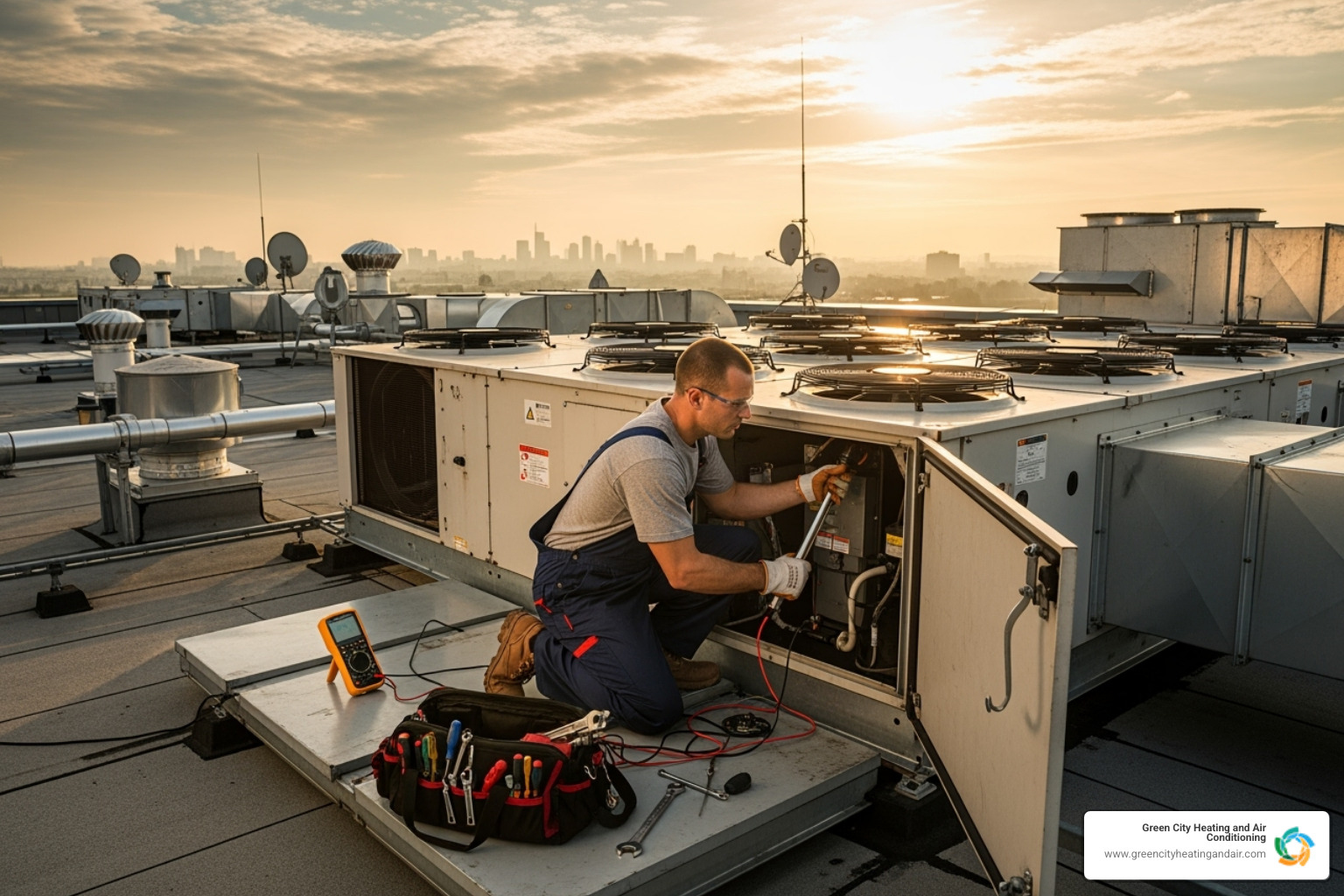
As you gain experience, you can move into roles like:
- HVAC Installer: Setting up and commissioning new residential and commercial systems.
- Repair & Maintenance Technician: Troubleshooting system malfunctions and performing routine tune-ups.
- Refrigeration Systems Technician: Working on specialized equipment like walk-in coolers and industrial chillers.
- HVAC Controls Technician: Programming and managing the sophisticated automated systems in modern buildings.
- Project Manager or Supervisor: Leading teams and overseeing the planning and execution of major installations.
- Energy Auditor or Solar HVAC Specialist: Focusing on improving energy efficiency and implementing green technologies.
- Business Owner: Starting your own contracting business after years of honing your skills and reputation.
Salary Expectations for a Licensed HVAC Technician
The earning potential in this field is impressive and grows with demand. In the United States, the median hourly wage for HVACR mechanics and installers was $27.55 as of May 2023, with nearly 400,000 workers employed in the field.
However, with experience and specialization, earnings can be much higher. Experienced technicians with proper licensing regularly earn $90,000 per year or more.
- HVAC Project Managers: Often earn $90,000+ annually.
- HVAC Controls Technicians: Typically earn around $83,000+.
- HVAC Supervisors: Can expect salaries of $82,000 or higher.
- Refrigeration Systems Technicians: Command salaries of $75,000+.
Your earning potential grows significantly with experience, specialization, and continued education. It's a career path that truly rewards dedication and professional growth.
Frequently Asked Questions about HVAC Licensing
Here are answers to some of the most common questions about becoming a licensed HVAC professional.
How long does it take to get an HVAC license?
The total time to become a fully licensed HVAC technician is typically three to five years. This includes:
- Formal Training: Certificate or degree programs usually take 1 to 2 years, though some pre-apprenticeship programs can be completed in as little as 12 weeks.
- Apprenticeship/Work Experience: This is the longest phase, generally requiring 1 to 5 years of on-the-job training. State requirements vary, with some mandating a specific number of years (e.g., four in California) or hours (e.g., 8,000 in Idaho) before you can sit for the licensing exam.
Can I get my HVAC certification online?
Yes, you can complete the theoretical coursework for many HVAC certifications online. This is a flexible option for learning refrigeration principles, electrical theory, and system design at your own pace. The mandatory EPA 608 certification exam, for example, can be studied for and taken online.
However, hands-on experience is non-negotiable in this trade. You can't learn to troubleshoot a furnace from a textbook alone. For this reason, many students choose hybrid programs that combine online classes with in-person lab sessions to develop the practical skills employers require.
Do licensing requirements vary by state or province?
Yes, licensing requirements vary significantly by location. There is no single national HVAC license in the United States; each state sets its own rules. Some states require licenses for all technicians, while others only license contractors. Canada uses a system of specific trade certifications (e.g., 313A, 313D, Gas Technician) rather than a general license.
Furthermore, there is a critical distinction between a technician license (allowing you to work for a company) and a contractor license (allowing you to own a business), with the latter having much stricter requirements. Always research the specific rules for the state, province, and even city where you plan to work before beginning your training.
Conclusion: Start Your Journey to a Rewarding HVAC Career
The path to becoming a licensed HVAC technician is a clear and achievable one, leading to a future-proof career. With a skilled worker shortage of approximately 110,000 expected by 2025, the demand for your expertise has never been higher. This demand ensures job security and significant earning potential, with experienced technicians making $90,000 or more annually.
As a licensed professional, you'll do more than just fix equipment. You will ensure families stay comfortable and safe, help businesses operate smoothly, and contribute to green energy initiatives with high-efficiency systems. Continuous learning will keep your career dynamic as you master new technologies and open doors to specialized, high-paying roles.
At Green City Heating and Air Conditioning, we've built our reputation on the skill of our dedicated, licensed professionals. We never subcontract because we believe in the quality that comes from a well-trained team.
Whether you're inspired to join the trade or need an expert for your home, trust a team that values skill and quality. For homeowners seeking top-tier service from highly trained professionals, learn more about our expert heater repair in Seattle and experience the difference that true expertise makes.
More Blogs
Latest
insights and tips
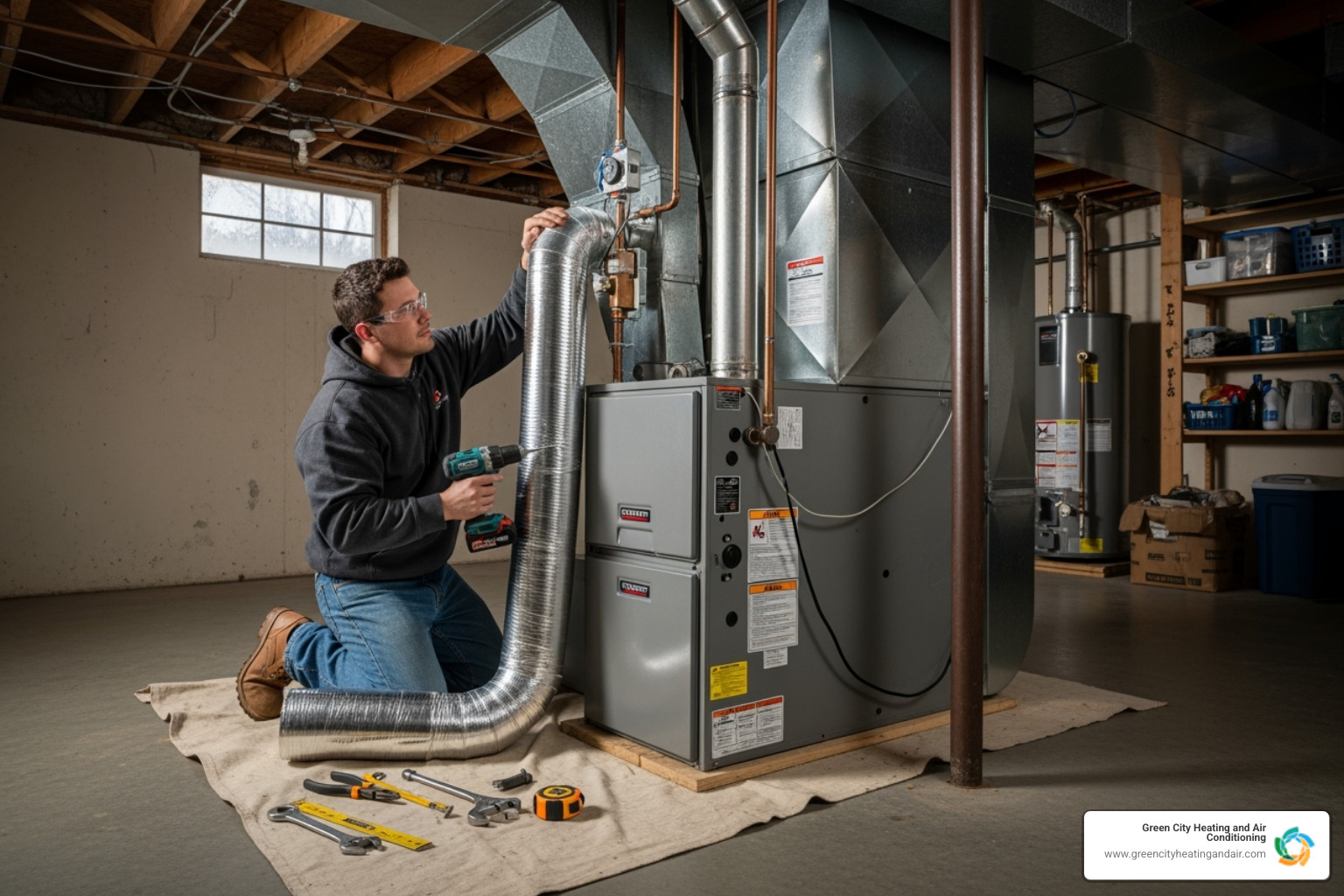
Warmth Unleashed: The Ultimate Seattle Furnace Installation Handbook
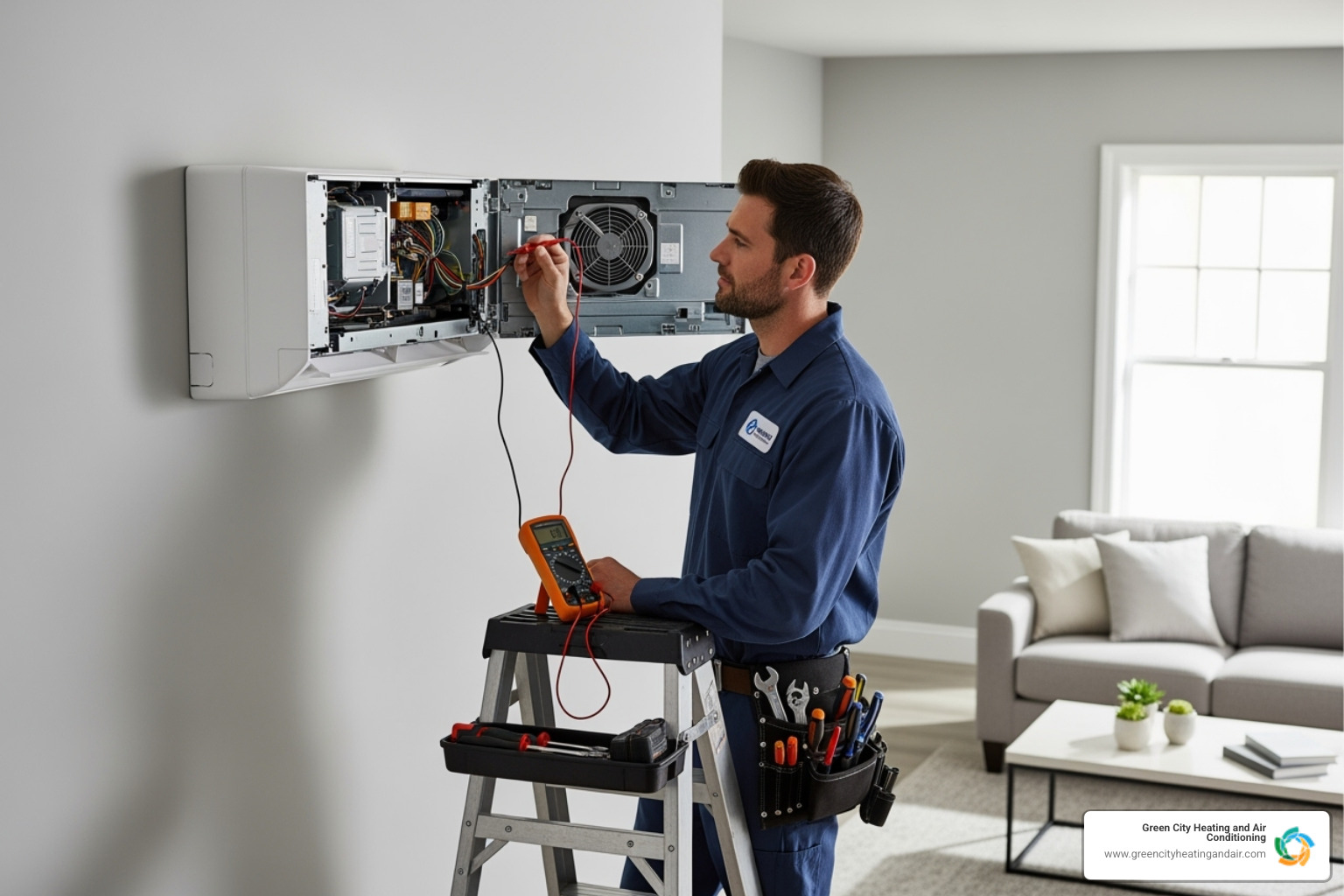
Emergency Ductless AC Repair in Bellevue: Get Your Cool Back Fast
